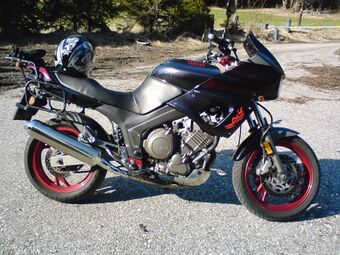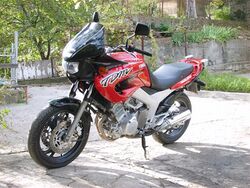Engineering:Yamaha TDM850
 | |
| Manufacturer | Yamaha Motor Company |
|---|---|
| Also called | TDM |
| Production | 1991- 2001 |
| Predecessor | XTZ 750 Super Tenere |
| Successor | Yamaha TDM 900 |
| Class | Sport touring |
| Engine | Mk I 850 cc liquid-cooled multi-valve parallel-twin 360-degree cranks / Mk II 850 cc liquid-cooled multi-valve crossplane parallel-twin 270-degree crank |
| Top speed | 130 mph (210 km/h)[1] |
| Power | 57 kW (77 hp)[1] |
| Torque | 80 N⋅m (59 lb⋅ft)[1] |
| Transmission | 5-speed manual |
| Seat height | 795 mm (31.3 in) |
| Fuel capacity | 20 L (4.4 imp gal; 5.3 US gal) |

The Yamaha TDM is an 849 cc DOHC parallel-twin motorcycle that heralded the modern "Sport touring" category. The TDM was first manufactured by the Yamaha Motor Company of Japan in 1991. The TDM has a pressed-steel frame and a dry sump engine with five valves per cylinder, (three inlet and two exhaust).
History
The TDM was arguably the first road-oriented "Adventure Sports" motorcycle. It was not intended as an off-road machine, but as a comfortable yet manoeuvrable all-rounder, rather like the Ducati Multistrada of later years. A TDM is too bulky and heavy for serious off-road work, but its long-travel suspension can cope with gravel tracks.
The TDM's engine was derived from the Paris Dakar winning Yamaha XTZ 750 Super Tenere. Yamaha intended to create a motorcycle capable of handling European mountain roads and coping with rougher road surfaces. The TDM's upright riding position seemed radical in its day.[citation needed]
The TDM was imported into the United States for only two years, 1992 and 1993. It was never a big seller in the United Kingdom nor at first in The Netherlands, but sales were strong in other European countries, particularly in France, Germany and Greece.[citation needed].
In 1996, instead of the previous 360 engine Yamaha released the Mk II TDM with updated bodywork and a 270° firing order engine that was shared with the TRX850, they also shared the same transmission.[2][3] This new engine was first seen in 1995, when Yamaha introduced its TRX850 in Japan.
Although early models came with no fuel gauge and a reserve fuel tap, beginning in 1999, Yamaha replaced the temperature gauge on the dashboard with a fuel gauge.
Successor
In 2001 the TDM850 was succeeded by the TDM 900, a more powerful bike with a similar concept to the 850. The TDM900 featured new bodywork, a diamond-shaped alloy frame, a 6-speed gearbox, fuel-injection, R1-derived brakes, a reduced dry weight of 190 kg, a larger-capacity 900cc engine, and slightly wider tyres (160 rear, 120 front). It has a 2-position trip meter, a digital clock, and digital fuel meter. ABS was available as an option. The engine has a maximum power output of 84.8 hp (63.2 kW) @ 7,500 rpm and torque 65.49 lb⋅ft (88.79 N⋅m) @ 7,500 rpm (claimed).[4]
Reception
MCN said of the TDM850 Mk II: "Fairly revolutionary when launched and certainly years ahead of its time, the Yamaha TDM850 was a sort of Multistrada 12 years before Ducati thought of it. As a serious ‘street trailie allrounder' it’s pretty effective too. The later 900 is better, but the Yamaha TDM850 is still decent, good value, different, and largely overlooked".[1]
References
- ↑ 1.0 1.1 1.2 1.3 "YAMAHA TDM850 (1991-2001) Review". Motorcycle News. November 24, 2006. http://www.motorcyclenews.com/bike-reviews/yamaha/tdm850/1991//.
- ↑ "YAMAHA TRX850 (1996-2000) Review". Motorcycle News. November 24, 2006. http://www.motorcyclenews.com/bike-reviews/yamaha/trx850/1996//.
- ↑ MacKellar, Colin (April 20, 1996). "Yamaha TRX 850". Motorcycle.com. http://www.motorcycle.com/manufacturer/yamaha/yamaha-trx-850-17077.html//.
- ↑ "2013 Yamaha TDM900". Top Speed. May 8, 2013. http://www.topspeed.com/motorcycles/motorcycle-reviews/yamaha/2013-yamaha-tdm900-ar153031.html//.
External links
 |
